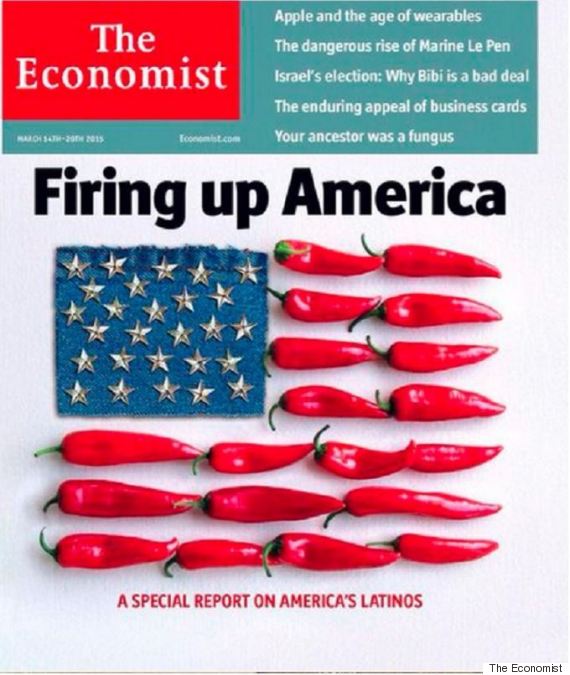The Economist’s Stars-and-Chiles cover, Why We Set It Straight

By Victor Landa, NewsTaco
The problem with working to gain attention is that you might be successful.
It wasn’t too long ago that U.S. Latinos were ignored. We were disparate groups that kept mostly to geographic outlines: Mexicans in the Southwest, Cubans in Florida and Puerto Ricans in New York and the Northeast, tied by language and cultural traits. Sad as it sounds, there were too few of other nationalities to be counted, much less plotted on a map.
Somewhere, at some point in relative memory, some folks gathered to brainstorm a way to paint the disparate groups as a collective, because it made political and marketing sense to politicians and marketers. The particular points of this part of the story are contentious: several people, groups, and self-proclaimed influencers allege to have been at the birth of the “Hispanic” idea. What matters is that it happened, and that things haven’t been the same since.
We longed to be counted and accounted. We knew why: our sons and daughters had served and bled in our armed forces, our collective spending power was a growing force, our culture was vibrant and our aspirations were quintessentially American.
Fast forward several decades and here we are, our population duly reckoned, our politics coveted, our discretionary income pursued, and our culture celebrated. Our challenges, though, haven’t gone away, they’ve just been updated. Mainstream America is taking us into account because we’re hard to ignore, there’re just too many of us. And we’re all over the map, in the most unsuspecting places – in deep woods Georgia and back corner Nebraska, you’ll find Latinos working, building, and contributing.
We’ve drawn attention to ourselves, so put a check in that box in our parents’ and grandparents’ wish list. Our challenge now is to keep a check on the quality of the attention. And that’s why I wasn’t surprised at the push-back after The Economist published its recent special report on Latinos. Most of the attention has been on the cover, a stylized stars-and-stripes with red chiles where the red bars are supposed to be. The idea, which probably sounded brilliantly creative in an editorial meeting where there wasn’t one single Latino, was to convey a message of integration – Latinos are the chiles, get it?
Different published commentaries pointed out different problems with the content of the 12-page report. A Colorlines piece enumerated five troubling areas, including the cover: Not all Latinos are immigrants; Obama isn’t offering amnesty; the “melting pot” metaphor is too Anglo-centric; and the words Latino and Hispanic are used interchangeably. Spot-on on all points except the last. Latinos and Hispanics use the terms interchangeably and bicker about it as a family matter. How can we expect others to know the difference? Can we expect them to choose one and stick with it when we can’t show them how?
Aside from that, the irritating stars-and-chiles cover is, in a perverse way, a step on the road to what we asked for. And the overwhelming negative reaction to it is exactly the sept we should be taking. It’s important to call national and international publications and broadcasts on their gaffes. We owe it to those who came before us, who dreamed of the day that mainstream America would pay so much attention to us that we’d need to make sure they got it right.
The Economist didn’t get it right. The stars-and-chiles is ignorant at best, insulting at its worst. For Latinos, the cover and the content’s misunderstandings are more evidence of the need for diversity in top-tier editorial positions. A Latino editor would have caught the insult at first glance, and the obvious stereotype wouldn’t have been perpetuated.
It’s what happens when you call attention to yourself. After you’re noticed you’ll have to start setting things straight. It’s a nod to the days we were ignored, and the work isn’t finished.
[Photo courtesy of The Economist]

